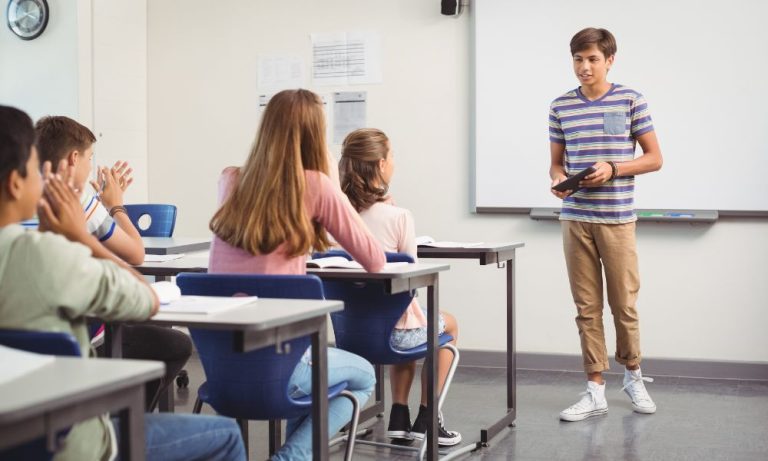Many students struggle with public speaking due to the fear of making mistakes, forgetting lines, or feeling judged by peers. When these fears creep in, students often experience anxiety and show reluctance towards speaking publicly. These fears can be overcome by building confidence in public speaking. Students need to develop confidence, which educators significantly contribute to. Today, we are exploring eight essential tips curated by Sanako to help students speak more confidently in public.
1. Supportive and Respectful Classroom
When students are in a supportive and respectful environment, they feel more comfortable when addressing an audience. Teachers can create a non-judgmental space where mistakes are viewed as part of the learning process rather than failures. This can be reinforced by establishing rules prohibiting distractions such as laughter, whispering, and phone use during presentations. Teachers can also encourage students to view public speaking as an opportunity to showcase their knowledge and skills rather than something to dread.
2. Allow Enough Time to Prepare
One of the most important factors that enhances confidence when public speaking is preparation. Having enough time to prepare is the key to reducing anxiety. Teachers should allocate a brief period for students to plan their responses before speaking. It should be enough time to allow them to organise their thoughts, check vocabulary, and rehearse key points mentally. When students are fully prepared, teachers can encourage them to leave their notes behind to focus on communicating and engaging with the audience rather than just reading aloud.

3. Provide a Clear Structure
It is crucial to have a clear structure when planning what to discuss. It will be less daunting for students if teachers offer them a framework for their speech. This guide can include sentence starters or conversational phrases. They will find it easier to create their speech, practice, memorise, and deliver it when the structure is clear.
4. Focus on Fluency Over Perfection
When students are learning about public speaking, teachers should emphasise the importance of fluency over obsession with factual precision. For example, if a class debates climate change, the focus should be on students expressing their opinions persuasively rather than recalling specific data points. Teachers should also balance corrections during speaking tasks. While feedback is essential, interrupting too often can discourage students.
5. Encourage Strong Delivery Techniques
After all the preparation is completed, it depends on the student to deliver the speech in a way that captivates the audience. Their delivery determines how the audience receives the speech. Teachers should emphasise the importance of giving their speech at a steady, deliberate pace instead of speeding through it. Teachers should also encourage them to project their voices so everyone can hear them. Another crucial factor is their body language. Teachers can encourage them to stand tall with confidence, use hand gestures, and make eye contact with the audience. Students should also be reminded to take necessary pauses and breathe in times of mistakes.

6. Offer Constructive Feedback
Constructive feedback is a great way to highlight their strengths. When parents note their strong points and praise them on areas they did well in, it boosts their confidence. This also makes it easier for them to positively receive the corrections where they made mistakes and need improvement. For example, commending a student on their delivery and confidence and correcting their pronunciation or vocabulary will still build their confidence. Classmates can also respectably offer constructive input, which may be positively received since it is coming from their peers.
Conclusion
Public speaking is a lifelong skill that helps them to communicate effectively. The confidence they develop will also come with the courage to express their ideas, share their knowledge, and connect with others on a deeper level. Whether in academic settings, professional environments, or personal interactions, the skills developed through public speaking can help them to attain their goals.

